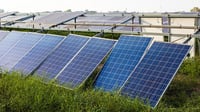Quality over price. That’s the name of the game when it comes to solar panels, inverters, batteries, and PV hardware components.
Wholesale buyers have expressed that quality matters in their purchasing decisions. Developers and installers want to source products that will last 20+ years and perform at optimal power levels.
Resellers and solar equipment brokers want to procure quality hardware to enhance their resale margin.
But no one wants to pay a premium that cuts into their profit earnings. Buyers want quality PV hardware at competitive prices.
In this article, we’ll share five sources to help wholesale buyers find quality products as well as where to go to compare solar equipment pricing and availability online.
What’s considered ‘quality’?
Before we get into the five buying sources, it’s important to determine what constitutes quality solar panels, inverters, and other PV hardware components. Quality is a subjective term, and therefore can have different meanings depending on who you talk to in the industry.
To put it simply, a quality solar product performs at the manufacturer’s advertised power output over a long period of time. Quality often correlates to your customer’s energy needs, and most PV professionals recommend forecasting energy consumption needs 15-20 years out.
In addition to operations and energy consumption, quality also relates to maintenance. Whether your customers are in the utility, commercial, or residential sector, they seek to invest in hardware that requires minimal maintenance. If there is an issue that calls for repair, the assurance of a warranty that will be honored over the long-term improves buyer confidence. In a nutshell, they want products that are built to last.
How can I verify the quality of PV products?
When faced with a buying decision, take these steps to verify the quality of the PV products in consideration.
 First and foremost, review the product’s data sheet. If the seller doesn’t provide the data sheet, then you can find it online by searching for the model / part number.
First and foremost, review the product’s data sheet. If the seller doesn’t provide the data sheet, then you can find it online by searching for the model / part number.
Second, reference the part number on various industry reports. This step primarily applies to solar panels, which make up most of a solar array both in quantity and cost. Industry reports like Kiwa PVEL’s PV Module Reliability Scorecard and the quarterly PV ModuleTech Bankability Ratings offer objective information to aid your decision-making process.
Third, if you’re looking to buy used solar panels and hardware, take the necessary steps to inspect and test the products before you buy. Oftentimes, used and refurbished PV products offered for resale are in good to excellent condition and may very well satisfy your customer’s needs. We also recommend buying from an R2 certified facility.
Fourth, ask others what they recommend. This step goes back to the age-old networking function of business. Call or chat with someone in person who you trust and who can share expertise about the specifics of your buying opportunity.
Asking others is an effective way to get insightful information fast...
At EnergyBin, account managers are available to offer objective advice. Just last month, a reseller asked an account manager about a container of solar panels he stumbled upon. The container was full of Tier 1 high efficiency modules that came from a cancelled project. In his buying considerations, he wanted to know what kind of resale value the modules were worth. Upon the advice of the EnergyBin rep, the reseller bought the container at the seller’s ask price, and within one week, resold the entire lot at a margin of $0.07 per watt. He profited $25,000 on this one deal!
5 sources to find quality buys
As a wholesale buyer, you may have strong relationships with manufacturers and distributors who are your first source to reach out to with your purchase orders. Keep nurturing these relationships, but also look beyond them for new partnerships to grow your business.
Like the example given in the previous section of the reseller who came across the container of Tier 1 modules from a cancelled project, you may discover opportunities that lead to unexpected profit gains. Expanding your social network is essential to tapping into new sources.
These five sources will expose you to quality products for sale and PV professionals who deal in such products day-in and day-out.
1. Search online product listings and request quotes.
Perhaps the best way to keep tabs on wholesale quality products is to join a B2B exchange like EnergyBin or pvXchange. You may also find online marketplaces helpful; although, many are B2C focused and therefore list retail prices.
Trading exchanges offer more value to wholesale buyers than marketplaces because they act as information powerhouses in addition to listing inventory. On EnergyBin, you can search for and compare product availability and price. You can send RFQs for product listings you’re interested in. And you can create a Want-to-Buy broadcast email to send to members.
Additionally, exchanges come with reporting functionalities and publish regular market reports. For example, EnergyBin publishes an annual PV Module Price Index and a biannual PV Hardware Trade Analysis, which track pricing and supply trends taking place within the exchange community. PvXchange publishes a monthly Market Analysis that reports on the price development of solar modules in the European market.
Furthermore, exchanges center on buyer-seller relationships; they’re not merely transactional like marketplaces are designed to be. This is a benefit to the buyer because it means that the sale is private between you and the seller. You may see a list price for a particular product, but you may not pay that exact price. Oftentimes, sellers are open to negotiate volume discounts, shipping and handling, and other value-add services. But you won’t know unless you ask. Start the conversation by requesting quotes from multiple sellers.
2. Browse auction sites and liquidation announcements.
Auction sites are useful for finding large lots of a particular product, which is often new hardware from manufacturers’ surplus. You may be able to snag a lot at a low bid. Keep in mind that auction sites tend to collect a buyer’s premium if you win the bid. Even so, if the final sale price minus the buyer’s premium is under your budget, then it may be a great buy.
Additionally, liquidation announcements may lead to quality buys. These announcements are published in trade magazines and on social media. Liquidations are a result of company downsizes or bankruptcies where sellers need to liquidate assets quickly to settle their debts. A liquidation sale may occur at an in-person auction on a specific date and time, or an auction site may manage the assets online.
3. Read buyer’s guides for new product releases.
Buyer’s guides are a quick reference look at new products entering the market. They offer product reviews and synopses for comparative purposes. Solar Builder Magazine and North American Clean Energy publish annual buyer’s guides for all kinds of product categories, including solar panels, energy storage, mounting hardware, inverters, electrical BOS, and more.
Although buyer’s guides don’t provide a direct contact to connect with about a product, they tend to include the listing company’s website. On the website, locate the phone number to call or inquire by contact form to get more information about the product.
4. Subscribe to sellers’ newsletters.
Many sellers publish inventory lists to their websites. But it can be cumbersome to regularly visit their websites. To ensure you don’t miss quality products for sale, subscribe to multiple sellers’ newsletters. You’ll get emails direct to your inbox that contain valuable information about product availability, pricing, and special offers.
Some sellers even offer free webinars that host guest presenters from major manufacturers who give detailed product demonstrations. Briefly reading through sellers’ newsletters keeps you informed of these types of learning opportunities.
Subscribe to EnergyBin’s Monthly Newsletter >>
5. Network, network, network.
The solar industry is all about building relationships. One of the best ways to start or nurture a relationship with a PV professional is to ask what you can give. That’s the essence of networking. Build rapport by offering to help others achieve their goals and challenges. Show sincere concern for seeing them succeed.
When you put others before yourself, you’ll receive tenfold what you give. For example, a friendly check-in with a customer may lead to a conversation about excess inventory they want to offload at a reduced price. Or sharing your insights at a solar conference could open the door to a new business partnership.
Your spirit of giving and helping others in your network will leave an impression that you’re someone worth knowing and doing business with.
A word of advice
Don’t limit yourself to just one or two sources to buy quality PV products. Instead, build a toolkit with multiple sources you can draw upon to expand your buying opportunities. Access the five sources we’ve discussed in this article on a regular basis for best results.
And in the spirit of networking, please reach out to our account managers at EnergyBin. We’re here to help connect you to sellers and are happy to provide input about PV hardware pricing and availability.
More Resources
 PV Hardware & Repowering Projects: Buying New and Reselling the Old
PV Hardware & Repowering Projects: Buying New and Reselling the Old
 Why the Most Effective Solar Equipment Brokers are REAL Networkers
Why the Most Effective Solar Equipment Brokers are REAL Networkers
